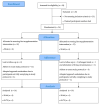Short-Term Protein Supplementation Does Not Alter Energy Intake, Macronutrient Intake and Appetite in 50-75 Year Old Adults
- PMID: 34070014
- PMCID: PMC8157839
- DOI: 10.3390/nu13051711
Short-Term Protein Supplementation Does Not Alter Energy Intake, Macronutrient Intake and Appetite in 50-75 Year Old Adults
Abstract
Ageing is associated with a reduction in muscle mass and strength, termed sarcopenia. Dietary protein is important for the maintenance of muscle mass through the promotion of muscle protein synthesis. However, protein is also reported to be a highly satiating nutrient. This raises concerns that protein intake for musculoskeletal health reasons in older adults may exacerbate age-related decreased appetite and may result in reduced energy and nutrient intake. This study aimed to investigate the effect of short-term protein supplementation and its timing (morning vs. evening), on energy and nutrient intake and appetite measures in middle-older age adults. Twenty-four 50-75 year olds were recruited to a randomised cross-over trial. In phase 1 (pre-supplementation) participants completed a food diary and reported hunger and appetite on three alternate days. During the second and third phases, participants consumed a 20 g whey protein gel (78 mL/368 kJ), for four days, either in the morning (after breakfast) or the evening (before bed), whilst completing the same assessments as phase 1. No differences in dietary intakes of energy, macronutrients and micronutrients were recorded when comparing the pre-supplementation phase to the protein supplementation phases, irrespective of timing (excluding the contribution of the protein supplement itself). Similarly, no differences were observed in self-reported feelings of hunger and appetite. In conclusion, a 20 g/day whey protein supplement given outside of meal-times did not alter habitual dietary intakes, hunger or appetite in this middle-older age adult population in the short-term. This approach may be a useful strategy to increasing habitual protein intake in the middle-older age population.
Keywords: appetite; protein; sarcopenia; supplementation.
Conflict of interest statement
The authors have no conflict of interest or disclosures to declare. The sponsors had no role in the design, execution, interpretation, or writing of the study.
Figures
Similar articles
-
Short-term effect of a protein load on appetite and food intake in diseased mildly undernourished elderly people.Clin Nutr. 2004 Oct;23(5):1146-52. doi: 10.1016/j.clnu.2004.02.011. Clin Nutr. 2004. PMID: 15380907 Clinical Trial.
-
The effects of whey and soy liquid breakfast on appetite response, energy metabolism, and subsequent energy intake.Nutrition. 2019 May;61:179-186. doi: 10.1016/j.nut.2018.11.007. Epub 2018 Nov 27. Nutrition. 2019. PMID: 30822749 Clinical Trial.
-
Appetite, food intake, and gut hormone responses to glycomacropeptide protein ingestion in older adults: A feasibility, acceptability, and pilot study.Appetite. 2024 Sep 1;200:107509. doi: 10.1016/j.appet.2024.107509. Epub 2024 May 23. Appetite. 2024. PMID: 38795943 Clinical Trial.
-
The Impact of Protein Supplementation on Appetite and Energy Intake in Healthy Older Adults: A Systematic Review with Meta-Analysis.Adv Nutr. 2021 Mar 31;12(2):490-502. doi: 10.1093/advances/nmaa115. Adv Nutr. 2021. PMID: 33037427 Free PMC article.
-
Appetite and energy balancing.Physiol Behav. 2016 Oct 1;164(Pt B):465-471. doi: 10.1016/j.physbeh.2016.03.038. Epub 2016 Apr 6. Physiol Behav. 2016. PMID: 27059321 Review.
Cited by
-
Comparison of Dietary Intake in UK Adults Aged 50 to 75 Years During the 2020 UK Covid-19 Lockdown Compared to their 2019 Intakes.JAR Life. 2021 Sep 23;10:50-53. doi: 10.14283/jarlife.2021.9. eCollection 2021. JAR Life. 2021. PMID: 36923515 Free PMC article.
-
Advances in the Potential Application of 3D Food Printing to Enhance Elderly Nutritional Dietary Intake.Foods. 2023 Apr 28;12(9):1842. doi: 10.3390/foods12091842. Foods. 2023. PMID: 37174380 Free PMC article. Review.
References
-
- Cruz-Jentoft A.J., Bahat G., Bauer J., Boirie Y., Bruyère O., Cederholm T. Writing Group for the European Working Group on Sarcopenia in Older People 2 (EWGSOP2), and the Extended Group for EWGSOP2. Sarcopenia: Revised European consensus on definition and diagnosis. Age Ageing. 2019;48:16–31. doi: 10.1093/ageing/afy169. - DOI - PMC - PubMed
-
- Houston D.K., Nicklas B.J., Ding J., Harris T.B., Tylavsky F.A., Newman A.B., Health ABC Study Dietary protein intake is associated with lean mass change in older, community-dwelling adults: The Health, Aging, and Body Composition (Health ABC) Study. Am. J. Clin. Nutr. 2008;87:150–155. doi: 10.1093/ajcn/87.1.150. - DOI - PubMed
Publication types
MeSH terms
Substances
Grants and funding
LinkOut - more resources
Full Text Sources
Medical



